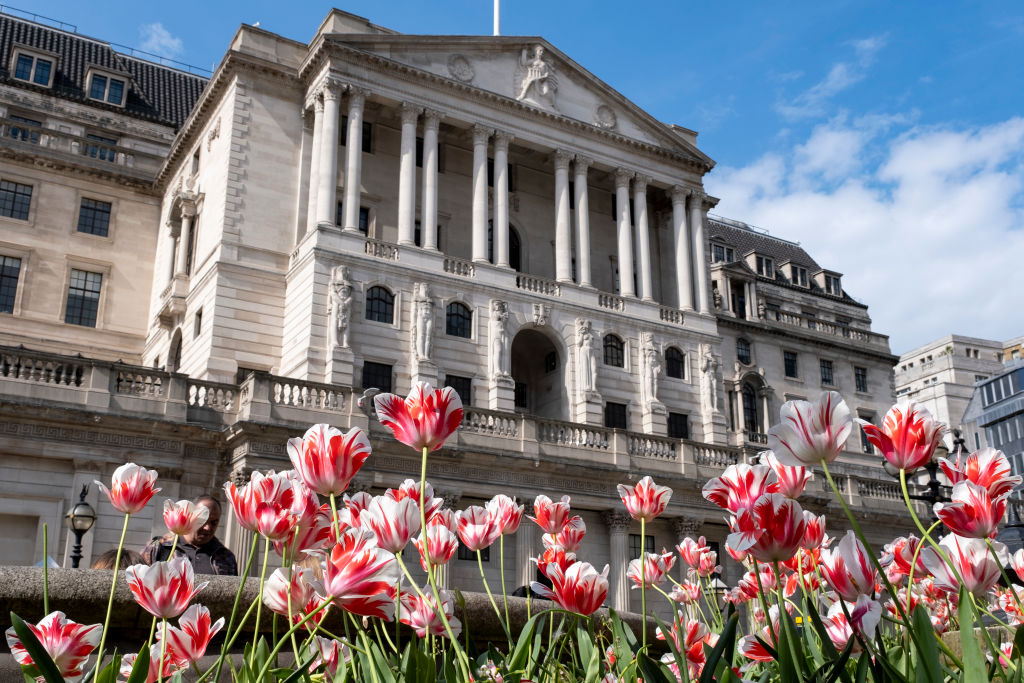What is inflation and how does it affect you?
The latest inflation figures are released each month. What is inflation and how does it impact your personal finances?


Get the latest financial news, insights and expert analysis from our award-winning MoneyWeek team, to help you understand what really matters when it comes to your finances.
You are now subscribed
Your newsletter sign-up was successful
Want to add more newsletters?
Inflation is one of the most important economic metrics that affects you and your money. There’s a good reason why the government and Bank of England (BoE) look at it so closely.
Put simply, inflation measures how much the overall level of prices for goods and services consumed by households has increased in a set period of time.
The key word here is “overall”. Most people buy a very wide range of goods and services, from energy and food to books and VR headsets, and these rise and fall in price by different amounts.
MoneyWeek
Subscribe to MoneyWeek today and get your first six magazine issues absolutely FREE

Sign up to Money Morning
Don't miss the latest investment and personal finances news, market analysis, plus money-saving tips with our free twice-daily newsletter
Don't miss the latest investment and personal finances news, market analysis, plus money-saving tips with our free twice-daily newsletter
The reason the government and BoE are so concerned with inflation is because it directly affects the wallets of both consumers and the public finances.
High inflation means prices are rising, pushing up the cost of both essentials and luxuries. If wages do not grow at the same rate, it means your income is slowly eroded in real terms.
The most recent set of inflation data shows the Consumer Price Index (CPI) measure rose by 3% in the 12 months to January 2026, down from 3.4% in December.
The fall isn’t expected to be short-lived either – the BoE is forecasting inflation will slow to 2.1% in April.
We take a closer look at what inflation is, how it is measured, and what it means for your finances.
What is inflation?
Inflation is a measure of how much prices have risen over a given time period. If you bought an apple for £1 in one year, but bought the same apple for £1.10 the next year, its price will have inflated by 10%.
That said, the rise in price of one item doesn’t reflect how much prices are increasing across an entire economy.
The apple’s price may have increased at a much faster rate than other services or products. For example, a poor harvest leading to fewer apples than usual could prompt a price rise due to the laws of supply and demand.
Furthermore, different people buy different things. You might be more likely to buy a packet of sweets than an apple, meaning you are less affected by the rising price of apples.
That is why the Office for National Statistics (ONS), the UK’s official statistics body, measures inflation by logging the prices of a wide range of things – known as its basket of goods.
This includes the prices of food, energy, clothes, hotels, train tickets, and much more. The basket is adjusted each year to make sure it accurately reflects what people are actually buying and to keep up with trends – for example, in 2025 the ONS added VR headsets to the basket of goods.
By measuring a wide range of prices, the ONS is able to get a much more holistic picture of how prices are changing across the entire economy, not just within one particular market.
Once the ONS has gathered all the prices, it calculates the level of inflation in the economy and expresses it through several different indices. The most widely reported is the Consumer Prices Index (CPI). This is an internationally-recognised measure of inflation.
CPI strips out housing costs like council tax and rent payments. Other indices include these, such as the Retail Prices Index (RPI) and the Consumer Prices Index including Owner Occupiers' Housing Costs (CPIH).
Measuring inflation is a useful way of measuring how our spending power has changed over time, but it also has a real-world impact.
For example, inflation rates are used to set the amount by which rail fares and some key utility bills go up. The figure also plays a role when determining how much the state pension will increase by.
Economists believe having some inflation (for example the Bank of England's 2% target, which is set by the government) is healthy for the economy because it encourages spending and means GDP can grow.
However, high inflation can do severe damage to living standards.
Why will there be inflation in an economy?
There are a whole host of reasons why prices rise in an economy.
As we saw in the apple example earlier, prices could be pushed higher because of natural causes leading to a shortage of a product.
On the other hand, prices can be artificially inflated through government actions. Last year in the United States, prices of many imported goods increased after Donald Trump imposed a sweeping set of tariffs (taxes paid to the government when importing goods).
On the whole, there are two main types of inflation – ‘cost-push’ and ‘demand pull’.
- Cost-push inflation: This type of inflation is caused by an increase in production costs. Imagine cocoa prices rise. This might make it more expensive for a chocolate company to produce chocolate bars. In response, the company can either produce fewer bars or put up its prices. In other words, the price of chocolate bars is pushed up by higher cocoa prices. In recent years, companies have also circumvented higher production costs by shrinking the size of products but keeping the price the same, known as ‘shrinkflation’.
- Demand-pull inflation: This type of inflation happens when demand outstrips supply. A good example is what happened after the Covid lockdowns ended. Households had saved up a lot of money while they were cooped up, and splurged after the economy opened back up.
Inflation expectations can also create price pressures.
If workers think prices are going to rise rapidly, they might negotiate larger pay rises from their employers. This pushes up costs for businesses by giving them a higher wage bill.
It also gives workers more money in their pocket, making them more likely to spend. Both effects worsen the inflation cycle.
How does inflation affect you?
Inflation affects different individuals and groups to different extents. Some people will have a much higher personal inflation rate than others depending on the types of things they spend money on.
For example, a gamer is much more likely to feel the effects of higher prices for consoles than someone who doesn’t use the technology.
The extent to which inflation affects the quality of your life also depends on your personal circumstances.
If the price of energy soars (as it did in 2022), the state pensioner will be spending a much higher proportion of their already stretched income to heat their home than a highly-paid banker.
But no matter who you are, price hikes will affect your budget, and may potentially reduce the number of things you can afford.
Inflation is also used by the government and businesses to set prices. Things like train fares go up in price every year depending on the inflation rate so, in theory at least, those services don't lose out from the erosion of the value of the pound.
Inflation can also work to your advantage. It's worth bearing the rate of inflation in mind when asking for a pay rise, or if you are a landlord and want to increase rents.
In your own personal finances, you will want to ensure the value of your money keeps up with or at least stays close to inflation. To achieve this, you will need to put your money into an inflation-busting savings account.
See our round-up of the best easy-access accounts, one-year savings bonds, regular saver accounts and cash ISAs.
Once you have built up sufficient cash savings, you may also want to consider investing, provided you are willing to lock the money away for at least five years to ride out short-term market volatility. Investing in a diversified portfolio of assets can be a good strategy for beating inflation.
Data from Barclays looking back over the past 120 years or so shows that equities have outperformed cash 70% of the time, based on a two-year holding period. If you extend the holding period to 10 years, it rises to 91% of the time.
We take a closer look at this topic in our beginner’s guide to investing, and in our piece on saving versus investing.
What is the Bank of England's role in controlling inflation?
The BoE, as the central bank, plays a key role in keeping inflation in check. The main way it does this is through bank rate.
Bank rate is the rate of interest the BoE pays to commercial banks, building societies and other financial institutions that hold money with it. It is also the rate the BoE charges on loans to them.
A change in bank rate usually means interest rates charged to everyday consumers go up or down, which can incentivise saving which is disinflationary, or spending, which is inflationary.
The BoE can also stimulate inflation through quantitative easing (QE), when it can’t lower the bank rate anymore.
This process involves buying bonds to push up their price. This leads to interest rates falling, encouraging people to spend money.
The BoE can also sell bonds through quantitative tightening (QT), to reduce money supply in the economy and slow inflation.
What is the difference between disinflation and deflation?
Disinflation and deflation are two different things, and understanding the difference between them is important.
Disinflation is the process that takes place when the rate of inflation falls. In a disinflationary environment, prices are still rising, but at a slower rate than they once were.
For example, if inflation one month reads 3.4% then the following month drops down to 3%, disinflation has occurred.
Deflation refers to when prices fall over time, also known as negative inflation. This might sound positive, but economists believe deflation is worse than inflation. It can lead to consumers holding off from spending in the hopes the price of something will fall in the future, causing an economy to slow.
In turn, this can result in recession and higher unemployment rates as companies lay off staff. Deflation can also make debts more challenging to pay off, as the real value of the debt goes up.
A classic example of this can be seen in the US Great Depression of 1929 to 1933, when prices fell by a third. Businesses that took on high levels of debt during the 1920s found they were no longer able to pay back their creditors, which led to a wave of repositions and bankruptcies, throwing millions out of work.
What is stagflation?
During the rise in inflation in 2025, some commentators said they believed the UK was at risk of falling into a stagflationary state as GDP growth was minimal while prices kept rising.
Stagflation is where economic growth is stagnant while inflation is high.
The resulting economic situation becomes challenging, as high inflation means the purchasing power of money is eroded while anaemic economic growth and unemployment mean people have less cash to spend.
The UK experienced a long run of stagflation in the 1970s when inflation reached 24.5% in August 1975. At the same time, the economy was contracting – GDP fell by 2.5% in 1974 and 1.5% in 1975.
Is Britain going to enter a similar state of stagflation in the near future? The answer is that it is probably too early to tell.
While some economic indicators (above-target inflation and low GDP growth) mirror the results you would expect from an economy about to enter stagflation, the situation is still far from being as dire as it was in the 1970s – especially considering that most economists expect inflation to trend downwards throughout 2026.
We take a closer look in our stagflation explainer.
Get the latest financial news, insights and expert analysis from our award-winning MoneyWeek team, to help you understand what really matters when it comes to your finances.

Daniel is a financial journalist at MoneyWeek, writing about personal finance, economics, property, politics, and investing.
He covers savings, political news and enjoys translating economic data into simple English, and explaining what it means for your wallet.
Daniel joined MoneyWeek in January 2025. He previously worked at The Economist in their Audience team and read history at Emmanuel College, Cambridge, specialising in the history of political thought.
In his free time, he likes reading, walking around Hampstead Heath, and cooking overambitious meals.
-
 The northern powerhouse city where first-time buyers are snapping up properties
The northern powerhouse city where first-time buyers are snapping up propertiesFirst-time buyers are “casting their nets” wider to find properties that match their budgets and lifestyles. We look at the top areas for first-time buyers.
-
 What the government’s baby boomer retirement data says about the future of pensions
What the government’s baby boomer retirement data says about the future of pensionsA study of the retirement routes of people born in 1958 paints a worrying picture for people’s pension savings
-
 Why Scotland's proposed government bonds are a terrible investment
Why Scotland's proposed government bonds are a terrible investmentOpinion Politicians in Scotland pushing for “kilts” think it will strengthen the case for independence and boost financial credibility. It's more likely to backfire
-
 How have central banks evolved in the last century – and are they still fit for purpose?
How have central banks evolved in the last century – and are they still fit for purpose?The rise to power and dominance of the central banks has been a key theme in MoneyWeek in its 25 years. Has their rule been benign?
-
 UK to have highest inflation among advanced economies this year and next, says IMF
UK to have highest inflation among advanced economies this year and next, says IMFThe International Monetary Fund (IMF) says it expects inflation to remain high in the UK, while lowering economic growth forecasts for 2026.
-
 Is Britain heading for a big debt crisis?
Is Britain heading for a big debt crisis?Opinion Things are not yet as bad as some reports have claimed. But they sure aren’t rosy either, says Julian Jessop
-
 'Britain is on the road to nowhere under Labour'
'Britain is on the road to nowhere under Labour'Opinion Britain's economy will shake off its torpor and grow robustly, but not under Keir Starmer's leadership, says Max King
-
 'Governments are launching an assault on the independence of central banks'
'Governments are launching an assault on the independence of central banks'Opinion Say goodbye to the era of central bank orthodoxy and hello to the new era of central bank dependency, says Jeremy McKeown
-
 Why investors can no longer trust traditional statistical indicators
Why investors can no longer trust traditional statistical indicatorsOpinion The statistical indicators and data investors have relied on for decades are no longer fit for purpose. It's time to move on, says Helen Thomas
-
 Live: Bank of England holds UK interest rates at 4.5%
Live: Bank of England holds UK interest rates at 4.5%The Bank of England voted to hold UK interest rates at their current level of 4.5% in March, as widely anticipated, after inflation rose to 3% in January